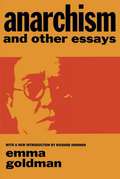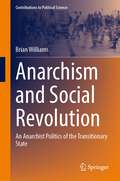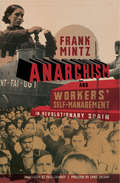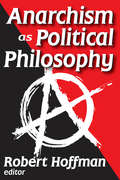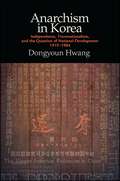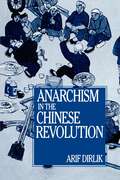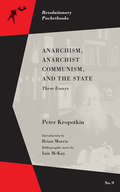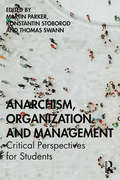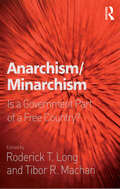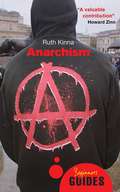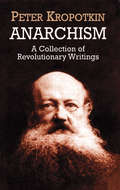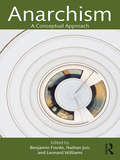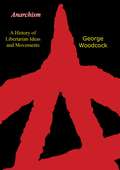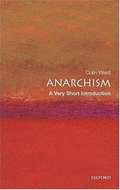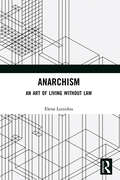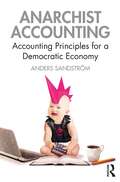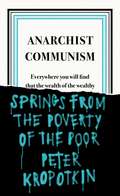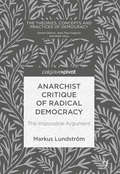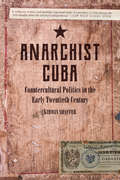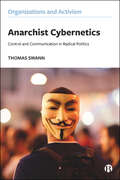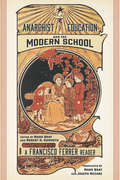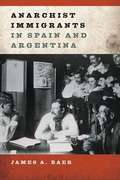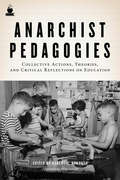- Table View
- List View
Anarchism and Other Essays
by Emma GoldmanIn the 1890s and for years thereafter, America reverberated with the name of the "notorious Anarchist," feminist, revolutionist, and agitator, Emma Goldberg. A Russian Jewish immigrant at the age of 17, she moved by her own efforts from seamstress in a clothing factory to internationally known radical lecturer, writer, editor, and friend of the oppressed. This book is a collection of her remarkably penetrating essays, far in advance of their time, originally published by the Mother Earth press which she founded.In the first of these essays, Anarchism: What It Really Stands For, she says, "Direct action, having proven effective along economic lines, is equally potent in the environment of the individual." In Minorities Versus Majorities she holds that social and economic well-being will result only through "the non-compromising determination of intelligent minorities, and not through the mass." Other pieces deal with The Hypocrisy of Puritanism; Prisons: A Social Crime and Failure; The Psychology of Political Violence; The Drama: A Powerful Disseminator of Radical Thought; Patriotism: A Menace to Liberty; and The Tragedy of Woman's Emancipation. A biographical sketch by Hippolyte Havel precedes the essays.Anarchism and Other Essays provides a fascinating look into revolutionary issues at the turn of the century, a prophetic view of the social and economic future, much of which we have seen take place, and above all, a glimpse into the mind of an extraordinary woman: brilliant, provocative, dedicated, passionate, and what used to be called "high-minded."
Anarchism and Social Revolution: An Anarchist Politics of the Transitionary State (Contributions to Political Science)
by Brian WilliamsThis monograph provides an update to anarchist philosophy, advocating for a paradigm shift beyond neoliberalism and liberal democracy. The book’s central thesis has two components. First, it is argued that the maximization of equal liberty requires historical progress beyond the sovereign state system. In contrast to Fukuyama’s (1992) argument that liberal democracy is the end of history, it is argued that liberalism contains two contradictions (socioeconomic inequality and the shortcoming in equal liberty inherent to state power) with the potential to propel history further. This book’s argument – libertarian social democracy – provides a framework to guide that final stage of history. Second, while anarchist philosophy offers a vision beyond the sovereign state, it can be rendered more suitable as an alternative paradigm. Specifically, it is argued that anarchism is hampered by its traditional adherence to prefigurative strategy, according to which the state cannot be used as a means to achieve a free and equal society. By contrast, libertarian social democracy incorporates a role for a democratic transitionary state (described here as gradualist anarchism) thus addressing mainstream “Hobbesian” concerns about bad anarchy (where decentralization yields a net loss in equal liberty). In so doing, the book reveals the full spectrum of anarchist strategy from prefigurative to gradualist.
Anarchism and Workers' Self-Management in Revolutionary Spain
by Paul Sharkey Frank Mintz Chris EalhamThis is the first English translation of Frank Mintz's seminal study of the economic experiments put into place during the Spanish Revolution to both sustain civil society during the war and, more importantly, act as the material basis for a new society. These plans weren't developed by professional economists but grew out of a political movement that put working people at the fore and believed that the collectivized workplace would be the cornerstone of economic life. Includes a prologue by Chris Ealham, author of Anarchism and the City. A retired professor of Spanish, Frank Mintz lives in Paris, France, and is active with the CNT labor union.
Anarchism and Workers' Self-Management in Revolutionary Spain
by Paul Sharkey Frank Mintz Chris EalhamThis is the first English translation of Frank Mintz's seminal study of the economic experiments put into place during the Spanish Revolution to both sustain civil society during the war and, more importantly, act as the material basis for a new society. These plans weren't developed by professional economists but grew out of a political movement that put working people at the fore and believed that the collectivized workplace would be the cornerstone of economic life. Includes a prologue by Chris Ealham, author of Anarchism and the City. A retired professor of Spanish, Frank Mintz lives in Paris, France, and is active with the CNT labor union.
Anarchism as Political Philosophy
by Robert HoffmanReports of people rejecting political authority, assaulting it with words and often violent acts, are actions that are part of modern life. Anarchism has been considered a dead movement of the nineteenth and early twentieth century, but it assumed a renewed and substantial relevance in the late twentieth century. Robert Hoffman points out in his incisive Introduction that anarchists have always been viewed either as foolish idealists or, at the other extreme, as serious threats to justice and social tranquility. But, the editor argues, most anarchists have been ordinary people who have shared a singular passion for what they believe to be a just society.To clarify widespread misconceptions about anarchism, this volume offers a lively debate on the subject, consisting of works by both advocates of anarchism and people who take it seriously but reject it. Represented here, in the writings of Pierre-Joseph Proudhon, Leo Tolstoy, George Bernard Shaw, Bertrand Russell, and others, are different types, styles, and periods of anarchist writing, reflecting a rich variety of thought arising from the anarchist perspective. The essays deal with many of the different strands of anarchists, including anarchist attacks on democracy, patriotism, and military conscription, and provide an outline of the movement's tumultuous history. Against these are set pieces that argue anarchism's impossibility and estimate its relevance to social change.The debate format of Anarchism introduces the reader to a fresh perspective and understanding of vital issues of political and social theory, and provokes him to examine his own thinking. Looking at both sides of the controversy, this volume discourages unquestioning or over-confident opinions. Although the anarchist credo that man can live without government is difficult or impossible for most people to accept, as long as we find it difficult to live within the framework of government control, the influence and potenti
Anarchism in Korea: Independence, Transnationalism, and the Question of National Development, 1919-1984 (SUNY series in Global Modernity)
by Dongyoun HwangThis book provides a history of anarchism in Korea and challenges conventional views of Korean anarchism as merely part of nationalist ideology, situating the study within a wider East Asian regional context. Dongyoun Hwang demonstrates that although the anarchist movement in Korea began as part of its struggle for independence from Japan, connections with anarchists and ideas from China and Japan gave the movement a regional and transnational dimension that transcended its initial nationalistic scope. Following the movement after 1945, Hwang shows how anarchism in Korea was deradicalized and evolved into an idea for both social revolution and alternative national development, with emphasis on organizing and educating peasants and developing rural villages.
Anarchism in the Chinese Revolution
by Arif DirlikArif Dirlik's latest offering is a revisionist perspective on Chinese radicalism in the twentieth century. He argues that the history of anarchism is indispensable to understanding crucial themes in Chinese radicalism. And anarchism is particularly significant now as a source of democratic ideals within the history of the socialist movement in China.Dirlik draws on the most recent scholarship and on materials available only in the last decade to compile the first comprehensive history of his subject available in a Western language. He emphasizes the anarchist contribution to revolutionary discourse and elucidates this theme through detailed analysis of both anarchist polemics and social practice. The changing circumstances of the Chinese revolution provide the immediate context, but throughout his writing the author views Chinese anarchism in relation to anarchism worldwide.
Anarchism or Socialism?
by Joseph StalinThis volume depicts the happenings of events in Georgia in 1905-1906 by a group of anarchists against the Marxists.
Anarchism, Anarchist Communism, and The State: Three Essays (Revolutionary Pocketbooks)
by Peter Kropotkin Brian MorrisAmid the clashes, complexities, and political personalities of world politics in the late nineteenth and early twentieth centuries, Peter Kropotkin stands out. Born a prince in Tsarist Russia, sent to Siberia to learn his militaristic, aristocratic trade, he instead renounced his titles and took up the "beautiful idea" of anarchism. Across a continent he would become known as a passionate advocate of a world without borders, without kings and bosses. From a Russian cell to France, to London and Brighton, he used his extraordinary mind to dissect the birth of State power and then present a different vision, one in which the human impulse to liberty can be found throughout history, undying even in times of defeat. In the three essays presented here, Kropotkin attempted to distill his many insights into brief but brilliant essays on the state, anarchism, and the ideology for which he became a founding name—anarchist communism. With a detailed and rich introduction from Brian Morris, and accompanied by bibliographic notes from Iain McKay, this collection contextualises and contemporises three of Kropotkin's most influential essays.
Anarchism, Organization and Management: Critical Perspectives for Students
by Martin Parker; Konstantin Stoborod; Thomas SwannYou might think that anarchism and management are opposed, but this book shows how engaging with the long history of anarchist ideas allows us to understand the problems of contemporary organizing much more clearly. Anarchism is a theory of organizing, and in times when global capitalism is in question, we need new ideas more than ever. The reader of this book will learn how anarchist ideas are relevant to today’s management problems. In a series of student-friendly short chapters on contemporary topics, the authors challenge the common sense that has allowed particular forms of organization and market to become globally dominant. Do we always need leaders? Is technological change always a good thing? Are markets the best way to arrange forms of exchange? This challenging book is essential for anyone who wants to understand what is wrong with business school theory and what we might do about it. For students and teachers of management, the standard textbook reproduces the dominant ideas about the way that business should be done. This book turns those ideas on their head, asking awkward questions about authority, technology and markets and demanding that its readers think hard about whether they want to reproduce those ideas too. Students of management, like everyone else, know that the current global system is broken but they don’t know what they can do about it. This unique book uses 200 years of anarchist ideas to give readers a clear guide for building the organizations and businesses of the future and places choice and responsibility at the centre of making a new world for people and the planet.
Anarchism/Minarchism: Is a Government Part of a Free Country?
by Roderick T. LongIt is well known that the radical libertarian philosopher Robert Nozick sharply distinguished his vision of the free society from egalitarian liberals such as John Rawls. Less remarked upon is the distinction he drew between the free society governed by a strictly limited government, commonly referred to as 'minarchism', and the society without any government at all - anarchism. In this volume, the editors, Long - an anarchist - and Machan - a minarchist - have brought together a selection of specially commissioned essays from key theorists actively involved in this debate. Each tackles the question of whether or not a government forms a legitimate part of a free society or whether anarchy/minarchy is merely a distinction without a difference.
Anarchism: A Beginner's Guide (Beginner's Guides)
by Ruth KinnaWhat do anarchists stand for? In this clear and penetrating study, Ruth Kinna goes directly to the heart of this controversial ideology, explaining the influences that have shaped anarchism and the different tactics and strategies that have been used by anarchists throughout history to achieve their ends. Kinna covers themes both historical and acutely contemporary, including: Could anarchy ever really be a viable alternative to the state? Can anarchist ideals ever be consistent with the justification of violence? How has anarchism influenced the anti-globalization movement? Ruth Kinna is Lecturer in Politics at Loughborough University, UK.
Anarchism: A Collection of Revolutionary Writings
by Peter KropotkinOne of the few members of the Russian aristocracy to become a revolutionary, Prince Peter Kropotkin (1842-1921) renounced his title at the age of 12. He later became one of the leading theorists of anarchism. Forced to flee his homeland in the 1870s to avoid arrest for his revolutionary activities against the czarist government, the noted geographer and social philosopher lived in exile, mainly in England, for the next 42 years of his life. During this period Kropotkin wrote a number of pamphlets on the practical and moral aspects of the anarchist movement. Allowed to return to Russia in 1917, he continued to write but remained vigorously opposed to the Bolsheviks and Marxist socialism.This collection contains a number of his important writings, including the brief but moving "Spirit of Revolt"; "Modern Science and Anarchism," an investigation of the scientific principles of revolutionary anarchism; "Law and Authority," an argument for social control through custom and education; "Prisons and Their Moral Influence on Prisoners," an unparalleled description of the evils of the prison system (which Kropotkin witnessed during his incarcerations); a note on the 1917 revolution and the Soviet government; and five other documents. Also reprinted is Kropotkin's article for the Encyclopaedia Britannica, "Anarchism," widely considered the best statement in English on the meaning, history, and aims of revolutionary anarchism.A valuable addition to the libraries of instructors and students of history and government, this modestly priced volume also will appeal to anyone interested in aspects of anarchist thought.
Anarchism: A Conceptual Approach
by Nathan Jun Benjamin Franks Leonard WilliamsAnarchism is by far the least broadly understood ideology and the least studied academically. Though highly influential, both historically and in terms of recent social movements, anarchism is regularly dismissed. Anarchism: A Conceptual Approach is a welcome addition to this growing field, which is widely debated but poorly understood. Occupying a distinctive position in the study of anarchist ideology, this volume – authored by a handpicked group of established and rising scholars – investigates how anarchists often seek to sharpen their message and struggle to determine what ideas and actions are central to their identity. Moving beyond defining anarchism as simply an ideology or political theory, this book examines the meanings of its key concepts, which have been divided into three categories: Core, Adjacent, and Peripheral concepts. Each chapter focuses on one important concept, shows how anarchists have understood the concept, and highlights its relationships to other concepts. Although anarchism is often thought of as a political topic, the interdisciplinary nature of Anarchism: A Conceptual Approach makes it of interest to students and scholars across the social sciences, liberal arts, and the humanities.
Anarchism: A History of Libertarian Ideas and Movements (Pelican Ser.)
by George Woodcock“‘Whoever denies authority and fights against it is an anarchist,’ said Sebastien Faure. The definition is tempting in its simplicity, but simplicity is the first thing to guard against in writing a history of anarchism. Few doctrines or movements have been so confusedly understood in the public mind, and few have presented in their own variety of approach and action so much excuse for confusion.” These are the opening sentences of this book, which brilliantly effaces confusion by providing a critical history of anarchist thought and practice.Mr. Woodcock traces the development of anarchism from its earliest appearances, and the rise and fall of anarchism as a movement aiming at practical social changes during the nineteenth and twentieth centuries. He discusses the ideas of the principal anarchist thinkers—Godwin, Proudhon, Bakunin, Kropotkin, Tolstoy, among others—and explains the various forms—anarchist individualism, anarchist communism, anarcho-syndicalism—that anarchist proposals for change have taken. The development of anarchist organizations, the various forms (peaceful and violent) of anarchist political action in Europe and America, the reasons for the appeal of anarchism at certain periods and to certain people—all these are given full treatment in Mr. Woodcock’s comprehensive work, which closes with a discussion of the causes of anarchism’s failure as a movement and with a consideration of whether there are any elements in anarchist thought that—despite the failure of anarchism as a political panacea—may still be worth preserving in the modern world.“The essential introduction to the classical anarchist thinkers.”—Mark Leier, Director, Centre for Labour Studies, Simon Fraser University
Anarchism: A Very Short Introduction
by Colin WardWhat do anarchists want? It seems easier to classify them by what they don't want, namely, the organizations of the State, and to identify them with rioting and protest rather than with any coherent ideology. But with demonstrations like those against the World Bank and the International Monetary Fund being blamed on anarchists, it is clear that an explanation of what they do stand for is long overdue. Colin Ward provides answers to these questions by considering anarchism from a variety of perspectives: theoretical, historical, and international, and by exploring key anarchist thinkers, from Kropotkin to Chomsky. He looks critically at anarchism by evaluating key ideas within it, such as its blanket opposition to incarceration, and policy of "no compromise" with the apparatus of political decision-making. Can anarchy ever function effectively as a political force? Is it more "organized" and "reasonable" than is currently perceived? Whatever the politics of the reader, Ward's argument ensures that anarchism will be much better understood after reading this book.
Anarchism: An Art of Living Without Law
by Elena LoizidouThe term anarchism derives from the Greek word ἀναρχία meaning ‘without ruler or leader, and without law’. Although the roots of the word can be traced back to Ancient Greece, anarchism as a political ideology is relatively new. Anarchism developed as a political ideology at the end of the eighteenth century at the time of the emergence of the modern State. And, as is well known, anarchism developed both a politics and a way of life that did not include the State as its compass, support and structure. In contrast to the extensive contemporary literature about anarchist politics and ideas, this book focuses on the practices and attitudes that constitute what the author refers to as an anarchist ‘art of life’. The book draws on archival material that records the life and actions of the anarchist Emma Goldman and her associates, legal documents and writings by classical (Pierre Joseph Proudhon, Peter Krotopkin) and contemporary anarchists (David Graeber, Saul Newman, Ciarra Bottici), as well as contemporary groups such as the Clandestine Insurgent Rebel Clown Army and Occupy Wall Street. By studying the idiosyncrasies of this art of life, it argues, we are better able to appreciate how anarchism is not some future utopian oriented project, waiting to come into existence after a revolution, but rather exists in parallel to the life and politics offered by the State. Anarchism: An Art of Living Without Law will be of interest to graduate students and academics working on critical legal theory, political theory, sociology and cultural studies.
Anarchist Accounting: Accounting Principles for a Democratic Economy
by Anders SandströmThis book is about accounting in an alternative libertarian socialist economic system. It explores what information and transactions we need to enable democratic and effective financial decisions by those affected by the decisions. Based on the economic model, participatory economics, the author proposes a set of accounting principles for an economy comprised of common ownership of productive resources, worker and consumer councils, and democratic planning, promoting the model’s core values. The author tackles questions such as how accounting could be organised in an economy with no private equity owners or private lenders and creditors that is not based on greed and competition but instead on cooperation and solidarity. A large part of the book is focused on issues regarding investments; thus, he asks how and on what basis decisions are made about the allocation of an economy’s production between consumption today and investments that enable more consumption in the future, and how investments are accounted for. He also considers how investments in capital assets and production facilities would be decided, financed, and valued if they are not owned by private capital owners and if allocation does not take place through markets but through a form of democratic planning. In answering these questions and more, the author demonstrates that alternative economic systems are indeed possible, and not merely lofty utopias that cannot be put into practice, and inspires further discussion about economic vision. By applying accounting to a new economic setting and offering both technical information and the author’s bold vision, this book is a comprehensive and valuable supplementary text for courses touching on critical accounting theory. It will also appeal to readers interested in alternative kinds of economies.
Anarchist Communism: Three Essays (Penguin Great Ideas)
by Peter Kropotkin'Everywhere you will find that the wealth of the wealthy springs from the poverty of the poor'Fuelled by anger at injustice and optimism about humankind's ability to make a better, truly communal society, the anarchist writings of Peter Kropotkin have influenced radicals the world over, from nineteenth-century workers to today's activists.One of twenty new books in the bestselling Penguin Great Ideas series. This new selection showcases a diverse list of thinkers who have helped shape our world today, from anarchists to stoics, feminists to prophets, satirists to Zen Buddhists.
Anarchist Critique of Radical Democracy: The Impossible Argument (The Theories, Concepts and Practices of Democracy)
by Markus LundströmThis book addresses the conflictual nature of radical democracy. By analyzing democratic conflict in Husby, a marginalized Stockholm city district, it exposes democracy’s core division – between governors and governed – as theorized by Jacques Rancière. Tracing the genealogy of that critique, the book interrogates a historical tradition generically adverse to every form of governance, namely anarchism. By outlining the divergent and discontinuous relationship between democracy and anarchy – within the history of anarchist thought – the author adds to democratic theory ‘The Impossible Argument’: a compound anarchist critique of radical democracy.
Anarchist Cuba: Countercultural Politics in the Early Twentieth Century
by Kirwin ShafferIn this volume, Kirwin Shaffer shows that anarchists played a significant—until now little-known—role among Cuban leftists in shaping issues of health, education, immigration, the environment, and working-class internationalism. They also criticized the state of racial politics, cultural practices, and the conditions of children and women on the island. In the chaotic new country, members of the anarchist movement interpreted the War for Independence and the revolutionary ideas of patriot José Martí from a Far-Left perspective, embarking on a nationwide debate with the larger Cuban establishment about what it meant to be Cuban. To counter the dominant culture, the anarchists created their own initiatives to help people—schools, health institutes, vegetarian restaurants, theater and fiction writing groups, and occasional calls for nudism—and as a result they challenged both the existing elite and the occcupying U.S. military forces. While many of their ideals flowed from Europe, their programs, criticisms, and literature reflected the specifics of Cuban reality and appealed to Cuba's popular classes. Using theories of working-class internationalism, countercultures, popular culture, and social movements, Shaffer analyzes archival records, pamphlets, newspapers, and novels, showing how the anarchist movement in republican Cuba helped shape the country's early leftist revolutionary agenda until the rise of the Gerardo Machado dictatorship in the 1920s. This important book places anarchism in its rightful historical place as a vital current within Cuban radical political culture.
Anarchist Cybernetics: Control and Communication in Radical Politics (Organizations and Activism)
by Thomas SwannFrom Occupy, to the Indignados and the Arab Spring, the uprisings that marked the last decade ignited a re-emergence of participatory democracy as a political ideal within organizations. This pioneering book introduces cybernetic thinking to politics and organizational studies to explore the continuing development of this radical idea. With a focus on communication and how alternative social media platforms present new challenges and opportunities for radical organising, it sheds new light on the concepts of self-organization, consensus decision making, individual autonomy and collective identity. Revolutionising the way in which anarchist activists and theorists think about organizations, this unprecedented investigation makes a major contribution to the larger discussion of direct democracy.
Anarchist Education and the Modern School: A Francisco Ferrer Reader
by Mark Bray Francisco Ferrer Robert H. HaworthFrancisco Ferrer navigated a tempestuous world of anarchist assassins, radical republican conspirators, anticlerical rioters, and freethinking educators to establish the legendary Escuela Moderna and the Modern School movement. Compiling many pieces translated into English for the first time, this collection presents Ferrer’s work in conversation with that of his comrades, collaborators, and critics to show the complex truth about the movement’s founder and martyr.
Anarchist Immigrants in Spain and Argentina
by James A BaerFrom 1868 through 1939, anarchists' migrations from Spain to Argentina and back again created a transnational ideology and influenced the movement's growth in each country. James A. Baer follows the lives, careers, and travels of Diego Abad de Santillán, Manuel Villar, and other migrating anarchists to highlight the ideological and interpersonal relationships that defined a vital era in anarchist history. Drawing on extensive interviews with Abad de Santillán, José Grunfeld, and Jacobo Maguid, along withunusual access to anarchist records and networks, Baer uncovers the ways anarchist migrants in pursuit of jobs and political goals formed a critical nucleus of militants, binding the two countries in an ideological relationship that profoundly affected the history of both. He also considers the impact of reverse migration and discusses political decisions that had a hitherto unknown influence on the course of the Spanish Civil War. Personal in perspective and transnational in scope, Anarchist Immigrants in Spain and Argentina offers an enlightening history of a movement and an era.
Anarchist Pedagogies: Collective Actions, Theories, and Critical Reflections on Education
by Allan AntliffImportant and challenging issues in the area of anarchism and education are presented in this history of egalitarian and free-school practices. From Francisco Ferrer's modern schools in Spain and the Work People's College in the United States, to contemporary actions in developing "free skools" in the United Kingdom and Canada, the contributors illustrate the importance of developing complex connections between educational theories and collective actions. Major themes in the volume include learning from historical anarchist experiments in education, ways that contemporary anarchists create dynamic and situated learning spaces, and critical reflections on theoretical frameworks and educational practices. Many trailblazing thinkers and practitioners contributed to this volume, such as Jeffery Shantz, John Jordon, Abraham de Leon, Richard Kahn, Matthew Weinstein, and Alex Khasnabish. This thoughtful and provocative collection proves that egalitarian education is possible at all ages and levels.
